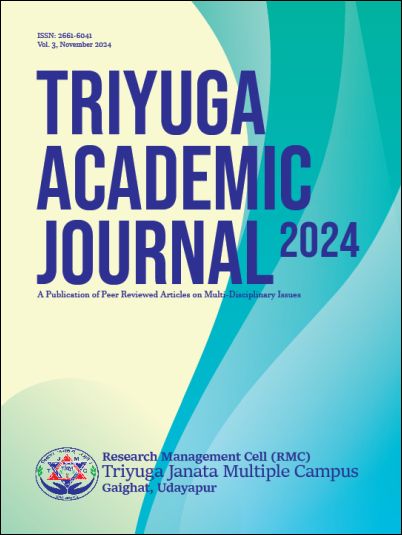Causes and Effects of Transnational Migration in Nepali Society in reference to Shinghak’s Remitland
DOI:
https://doi.org/10.3126/taj.v3i1.71952Keywords:
immigration, transnational migration, remittance, homeland, host-landAbstract
Transnational migration for the purpose of work and financial gain had a long history of Nepali society. Nepali youths had the dream of getting recruited in British army during the Second World War and the trend continued with Nepali youths’ placement in Indian army in Gurkha regiment. After Maoist movement in Nepal, transnational migration became even more popular for many reasons. The study inquires why Nepali people choose transnational migration and what happens because of transnational migration. For this, the causes and results of transnational migration have been studied in Shyam Shinghak’s Remitland. The major objectives of the study are to explore the causes and effects of transnational migration. Steven Vertovec and Jenine Dahinden’s theory of transnationalism is used in the study. Some other theorists like John McLeod, Rebecca L. Walkowitz, Andrew M. Gardner, Roland Végső and Winfried Fluck’s ideas of transnational literature are borrowed for the analysis of the novel. The study finds that financial insecurity, unemployment, frustration among Maoist militia after the ten years’ war, family problems, longing for independency, single mothers’ problem of rearing children and educating them, social and family pressure, personal desires etc. are some of the causes of transnational migration of Nepali people. They are attracted to transnational migration because of their compulsion to earn money for the family. The study shows that Nepali people choose gulf countries for migration because of the easy availability of man power agents and low investment. Nepali workers leave homeland and go to the gulf countries, host land, for the hard work in construction activities, animal farming in the desert, household work, factories and sanitation. Many man power companies cheat the workers as they promise to provide them with good position in company and then compel them to work hard in another low-grade job as they reach the nation of immigration. These migrants in the gulf countries must return to their homeland as they can never be permanent resident there. Therefore, they are the major sources of remittance for the country. Transnational migration has many effects in the life of migrants, their family members and mainly the spouse. Psychological, social, and financial effects are visible in the society of migrants in origin country Nepal. The major conclusion of the study is that the major characters of the novel leave the homeland for earning money. However, the separation of migrant with the homeland has several effects on the lives of migrants and their family members.
Downloads
Downloads
Published
How to Cite
Issue
Section
License
Copyright (c) 2024 Triyuga Janata Multiple Campus

This work is licensed under a Creative Commons Attribution-ShareAlike 4.0 International License.
© Triyuga Janata Multiple Campus




